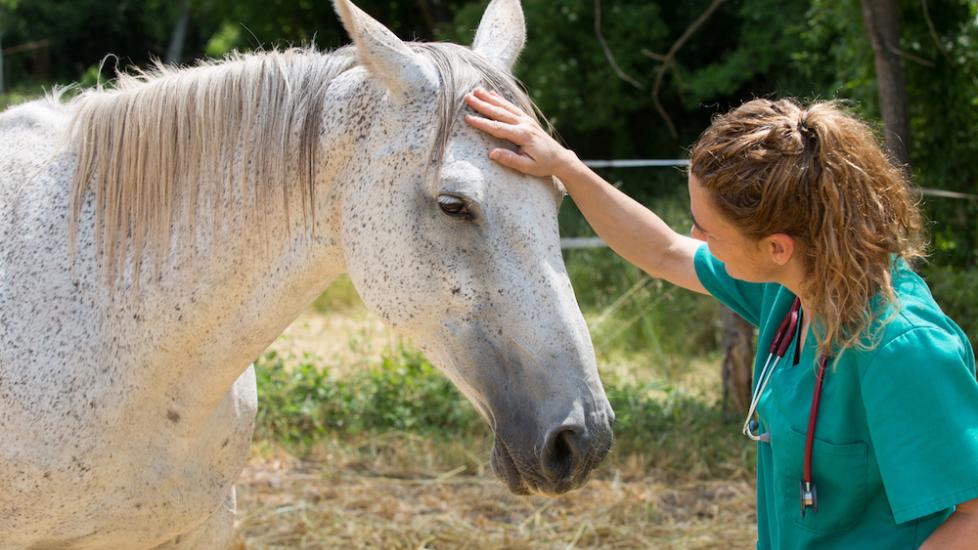Malignant Hyperthermia in Horses
What is Malignant Hyperthermia in Horses?
Malignant hyperthermia (MH), a term meaning deadly high body temperature, is a rare, genetic disease involving the horse’s muscular system. It can be seen in Quarter Horses and related breeds, like Appaloosas and American Paint Horses. It occurs in <1% of the Quarter Horse population. There is no gender or age tied to the condition.
Unfortunately, episodes of MH usually occur suddenly and are severe. During an episode of MH, the horse’s muscles become very rigid and contract uncontrollably and the horse will start breathing heavy and sweating profusely. Their heart rate and temperature will increase. The normal body temperature for a horse is 98-101.5 F, but in an episode of MH the temperature may reach up to 109 F.
An episode of MH is an emergency and often is life threatening. Even with immediate treatment, episodes of MH are frequently fatal.
Symptoms of Malignant Hyperthermia in Horses
-
Muscle rigidity
-
Elevated body temperature
-
Elevated heart rate
-
Irregular heartbeat
-
Excessive sweating
-
Shallow breathing
Causes of Malignant Hyperthermia in Horses
MH is caused by a genetic mutation in the RYR1 gene. It is a dominant gene mutation, meaning that the horse needs only one mutated gene, either from their sire or dam to be affected. This gene is responsible for regulating calcium release within the cells of skeletal muscles. The clinical signs that occur during an episode are the result of excessive calcium release causing overactive muscle activity.
The most common cause of MH in horses is the use of inhalant (gas) anesthetic drugs. These drugs are used when a horse is in an equine hospital and undergoing surgery or another medical procedure. MH can also be triggered by stress, excitement, apprehension, and exercise. Rarely, other drugs like succinylcholine (a neuromuscular blocking agent) will cause an episode. MH can also occur in conjunction with a horse “tying up” especially if that horse also suffers from another genetic disorder, specifically, type 1 polysaccharide storage myopathy (PSSM1).
How Veterinarians Diagnose Malignant Hyperthermia in Horses
During an acute episode of suspected MH, your veterinarian will make a tentative diagnosis based off the characteristic clinical signs, like a significantly elevated body temperature and rigid muscles. They will also perform bloodwork to look for electrolyte imbalances and acid/base issues.
A formal diagnosis of MH is made using genetic tests on hair and blood samples. Your veterinarian can submit the sample to a diagnostic laboratory. You may also order a genetic testing kit through the American Quarter Horse Association. The AQHA has a 5-panel genetic test that tests for MH as well as PSSM1, HYPP, GBED, and HERDA.
It would be helpful to know if your horse has any other genetic disorders because managing those appropriately may decrease the chances of your horse having an MH episode and lessen its severity should an episode occur.
A family history of any known genetic defects would also be useful. Since it is a dominant mutation, if a parent or sibling horse has MH, there is a higher chance your horse would too.
Treatment of Malignant Hyperthermia in Horses
Emergency care needs to be given as soon as possible during an episode of MH. If the patient is under general anesthesia, the inhalant gas anesthetic should be stopped immediately, and the horse should continue to be ventilated with oxygen.
Intravenous fluids should be administered and efforts to cool the horse externally with fans, ice packs, and hydrotherapy should be made. A medication called dantrolene should be administered intravenously.
In the less likely occurrence of a non-anesthetic related episode, similar external cooling efforts should be initiated immediately. An intravenous catheter needs to be placed and fluids started. If possible, move the horse to a cool, darkened stall or shaded area.
Recovery and Management of Malignant Hyperthermia in Horses
Should a horse survive an acute episode of MH, care should be taken to manage side effects and any complications. Frequent monitoring of blood panels and coagulation (blood clotting) profiles are needed to check for organ damage. Acute kidney injury is a common complication of an MH episode and can lead to death.
Despite recovering from an episode of MH, the prognosis for full return to health is guarded. Prolonged elevated body temperature often leads to irreversible organ damage and ultimately is fatal.
If your horse is diagnosed with MH, stress must be minimized to help prevent an episode from occurring. Even though a horse may have the gene mutation for MH, it may appear normal in the absence of a triggering event.
If a horse that has MH needs anesthesia, certain precautions can be made to lessen the chance that the horse will have an episode. This includes administering dantrolene by mouth 2-3 hours prior to surgery and using a non-inhalant anesthetic protocol if possible. Not all triggering events will lead to a MH episode, but it is best to minimize and avoid as many triggers as possible since MH often ends in fatality.
Featured Image: iStock.com/fotoedu
Help us make PetMD better
Was this article helpful?
